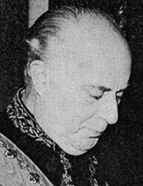

Eduardo Brazão explored foreign archives, read thousands of documents, filled in information that others had left incomplete, corrected judgments based on unfounded assumptions, and after many years of rigorous analysis, in accordance with the principles of the French school of methodology, he had a clear notion that "it is not enough to simply compile documented facts, it is also necessary to interpret them in light of life" (A diplomacia portuguesa…, Vol.I, p. 12). He was interested in finding the testimony, the document, the irrefutable evidence, to ultimately come to the conclusion that the task of the historian was also to realize what was not left on paper. He did not want apologetic history, though he was unable to prevent his immense sense of patriotism from guiding him in his reading on his country's past. His most gratifying work was, undoubtedly, As Relações Externas de Portugal. Reinado de D. João V (Two volumes, 1938), which he even came to nickname his "first book." There he gathered several published articles, taking the first steps towards a future "great Diplomatic History of Portugal, rich in documentation." It was a fixed idea that clashed with an inexhaustible wellspring of unpublished sources that had to be read, selected "and have history extracted from them, or to present them in full when, by their importance, they constituted indispensable elements for knowledge of the facts” (Reinado de D. João V, 1938, p. 10).
The historian's mission consisted of collecting elements that would enable thinking about "the action of our men in command at such times" and drawing "a lesson from it all". It was a pragmatic conception that was widely criticized by the Annales historiographical movement, which opposed the integration of history into the social sciences.
His work in diplomatic roles earned him several awards in national and foreign honorary orders. His historiographical works earned him admission as a corresponding member of the Portuguese Academy of History (1938). Twenty years later, he rose to full member and, in 1975, he was elected Second Vice President, becoming part of the first board of directors chaired by Joaquim Veríssimo Serrão. He was also a scholar of the Royal Academy of History in Madrid, administrator of the Istituto Portoghese di Sant'Antonio, in Rome, and a member of many other institutions and committees. In his memoirs he was very critical of the academies, lamenting that they had become "upper chambers in which full-scale mutual praise is practiced... only for its members to peck at one another on the outside" (Memorial, p. 335).
